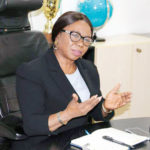
By Chioma Obinagwam
United Bank for Africa Plc (UBA), the pan African financial institution with presence in 20 African countries has announced its unaudited 2018 Third Quarter (Q3) Financial Results, with impressive growth in Gross Earnings, which berthed at ₦374.8 billion, a 12.3 percent increase when compared to ₦333.9 billion recorded in the corresponding period of 2017.
According to the report filed to the Nigerian Stock Exchange(NSE) recently, UBA’s net operating improved 1.7 per cent year-on-year to ₦227.7 billion, when compared to ₦224 billion achieved in the similar period of 2017.
Amidst inflationary pressures and uncertainties undermining the business environment in Nigeria and a few other countries in Africa, UBA’s operating expenses only increased by 2.3 percent to ₦149.1 billion, as against N145 billion recorded in the same period of last year. The low cost profile can be better appreciated when put in the perspective of double digit inflation rate in Nigeria.
Overall, the Bank posted a Profit Before Tax of N79.1 billion whilst Profit After Tax stood at ₦61.7 billion. This profit performance puts the Bank’s annualized return on average equity at 16% and 20% at pre-tax and post-tax profit level respectively.

The Bank continues to maintain a very strong balance sheet, with Total Assets of ₦4.51 trillion, an impressive 10.8 percent year-to-date rise over the ₦4.07 trillion total asset recorded as at December 2017. Another strong indication of the growth of the Bank and more so, acceptance of the franchise across Africa is the remarkable 16.2 percent year-to-date growth in Customer Deposits, which grew to ₦3.18trillion, compared to ₦2.73 trillion as at December 2017.
The shareholders’ fund remained very strong at ₦509.3 billion, even as the implementation of International Financial Reporting Standard (IFRS) 9, moderated the Group’s equity by 3.8 percent year-to-date.
Commenting on the result, the Group Managing Director/Chief Executive Officer (MD/CEO), UBA Plc, Kennedy Uzoka, said, “We achieved a number of strategic imperatives during the quarter and committed more investments in the future of the business – building a solid foundation for sustainable and superior return to our shareholders.’
Uzoka said that he is pleased that the Bank’s Virtual Banking Chatbot, Leo, which debuted on Facebook earlier in the year, was successfully launched on WhatsApp during the quarter.
“This new channel offering, which enables our customers to fulfill their banking transactions through simple chat commands, is another premier initiative in our suite. The early pay-offs are quite compelling – recent customer acquisitions and broader transaction volume growth are exciting leading indicators that reinforce our confidence in these novel channels,” he said.
“Our franchise is increasingly renowned for financial solution and I am happy with the consistent growth in our businesses across the continent. We have grown balance sheet by 11 percent year-to-date to over ₦N4.5 trillion. Notwithstanding the statutory-induced cost growth, our earnings proved resilient, as we recorded nine-month profit before tax of ₦79 billion. Notwithstanding the macro-risk arising from upcoming elections in Nigeria, our single largest market, we are confident of finishing the year strong,” Uzoka concluded.
Also speaking on UBA’s financial performance and position, the Group Chief Financial Officer (CFO), Ugo Nwaghodoh said that despite the relative volatility in the third quarter of 2018, especially in the face of U.S. interest rate hikes and concerns over global trade war, which has disrupted the interest and exchange rate environment in many African countries, the bank remains on track to deliver its earnings target for the year.
He said, “We remain committed to our five-year plan of working down CIR to 50 percent, which we consider to be a normalised medium-term CIR. Overall, we closed the third quarter with a post-tax RoAE of 16 percent and the Group remains well capitalized and liquid, as reflected in the Group’s capital adequacy of 21 percent and Bank’s liquidity ratio of 53 percent.”








Leave a comment